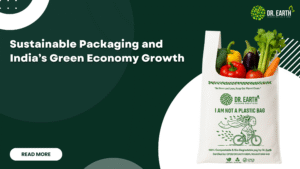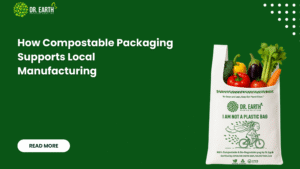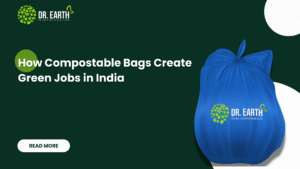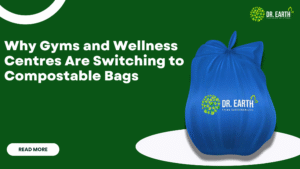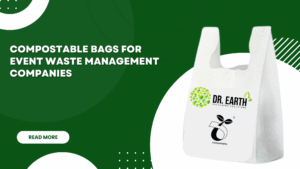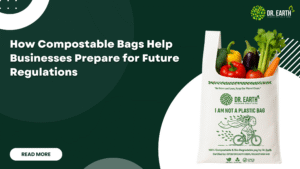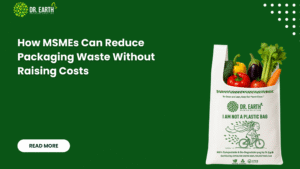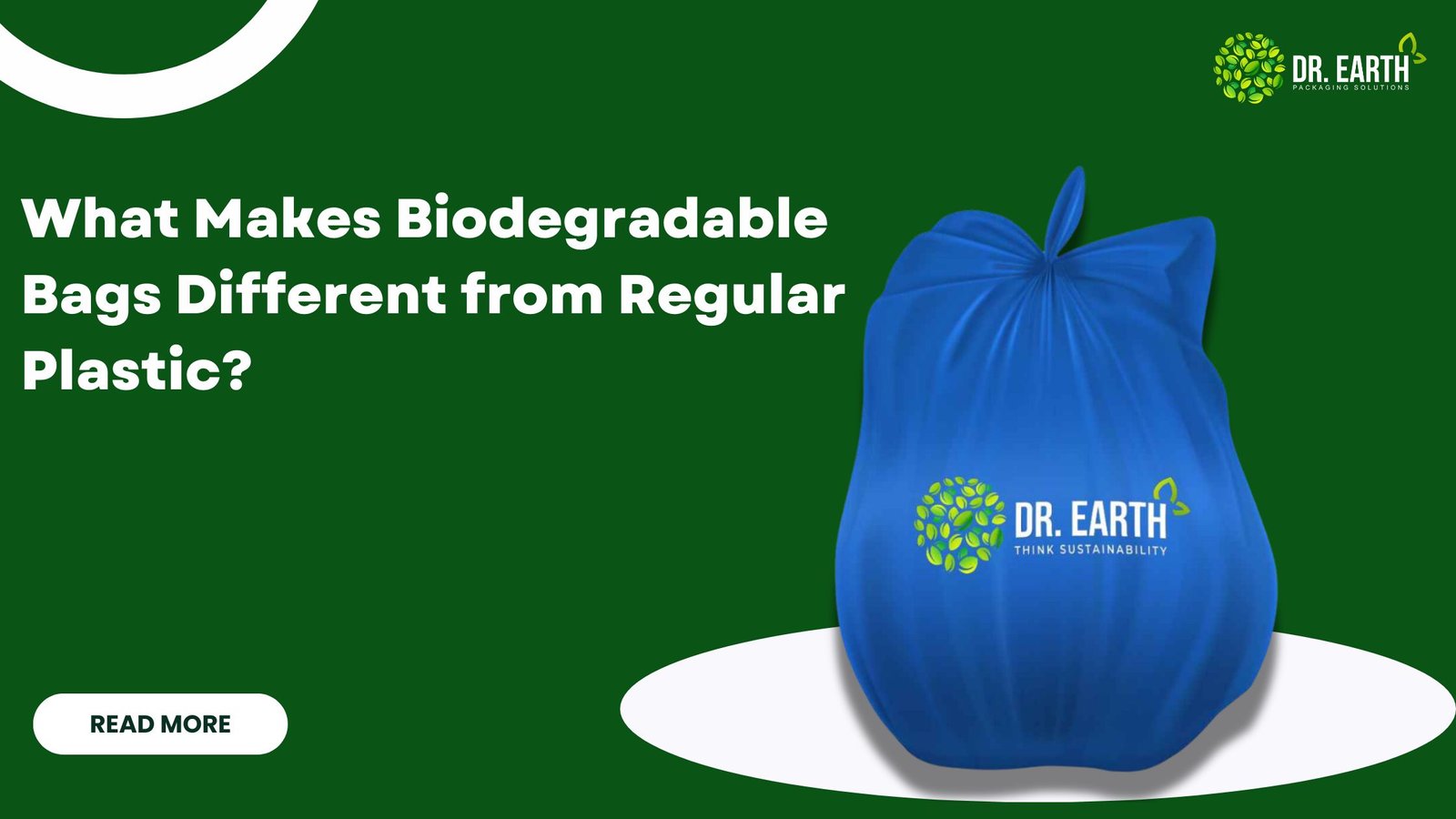
One of the most important environmental issues in our times is plastic pollution. Millions of tons of plastic waste are being produced and accumulating in landfills and oceans, creating a great demand for sustainable alternatives. The alternative biodegradable bags serve as an eco-friendly solution to fight plastic pollution. The definition of biodegradable bags exists alongside explanations of their benefits for businesses along with consumer motivation.
Dr. Earth bases its operations on sustainability and it manufactures top-quality eco-friendly transparent bags that support ecological conservation through decomposition. Users can order their environmental-friendly bags from the Dr. Earth website, which makes both businesses and customers able to select sustainable products.
Understanding Biodegradable Bags
Biodegradable bags function as designed through natural breakdown processes that run through bacterial and fungal microorganisms. Unlike normal plastic bags that may last in the environment for hundreds of years, biodegradable bags will decompose in months or just a few years, leaving only a small residue.
They are usually derived from natural resources such as cornstarch, polylactic acid (PLA), and polybutylene adipate terephthalate (PBAT). Biodegradable bags sometimes need particular composting conditions to decompose fully, but some break down in natural settings.
Understanding Regular Plastic Bags
plastic bags are made from petrochemical polymers, polyethylene and polypropylene. These plastics are very robust. This characteristic has made them extremely useful in so many applications. However, their durability poses some problems with regard to their disposal. Plastic bags do not decompose but become smaller particles, which is a term called microplastics, and persist in the ecosystems for a long period of time with serious risks for wildlife and human health.
Key Differences Between Biodegradable and Regular Plastic Bags
- Decomposition Time
- Biodegradable bags decompose in months to few years.
- Common plastic bags can be contributing to environmental pollution for hundreds of years, because they decompose very slowly.
- Material Composition
- Biodegradable bags come from plant-based or compostable materials.
- Petroleum-based non-renewable polymers constitute regular plastic bags.
- Environmental Impact
- Biodegradable bags emit few carbon emissions; they also make minimal waste as they decompose.
- Plastics contribute to environmental pollution, endangering marine species and wildlife as well.
- Breakdown Process
- Biodegradable bags dissolve through natural microbes.
- Regular plastic bags decompose into microplastics that end up contaminating soil and water.
The Environmental Consequences of Regular Plastic Bags
1. Landfill Overload
Soil dumping sites receive large amounts of plastic waste materials. Regular plastic bags remain intact in the environment because they decompose slowly which leads to space utilization and contamination. Environmental pollution worsens as this procedure generates harmful chemicals which spread into the environment.
2. Ocean Pollution
The severe consequence stemming from plastic waste pollution occurs through contamination of oceans. Each year millions of plastic bags cause fatal harm to aquatic animals by entering into rivers and streams. Plastic bags cause death to sea turtles together with fish and seabirds because they falsely identify the bags as food. The breakdown process of biodegradable bags produces less negative effects for ocean environments than non-biodegradable bags do.
3. Impact on Wildlife
The swallowing of plastic bags and subsequent trapping creates destructive injuries that results in suffocation before eventual death for animals. Products based on biodegradable materials can easily replace plastics in use which helps prevent environmental hazards thereby ensuring wildlife safety.
4. Microplastic Contamination
The decomposition of plastic bags leads to microplastic formation which contaminates both soil and water systems as well as the networks of feeding organisms in nature. Scientific studies show microplastics appear in human organs together with seafood and also persist in drinking water supplies. The decomposition process of biodegradable bags occurs completely without generating any toxic remains.
Advantages of Using Biodegradable Bags
1. Reduction in Carbon Footprint
Fewer fossil fuels, with less emission of greenhouse gases, are used for the production of biodegradable bags compared to the traditional usage in plastic manufacture. This can be a very huge benefit to businesses and consumers that intend to cut carbon emissions by switching to biodegradable alternatives.
2. Improved Waste Management
Compostable biodegradable bags are, just like Dr Earth offers, composted with organic waste to minimize the landfilling impact. Effective waste disposal is also ensured through their proper disposal as part of sustainable waste management methods.
3. Regulatory Compliance
Regulations on single-use plastics are being implemented across the globe. Companies that shift to biodegradable packaging will be able to maintain compliance with environmental regulations and increase their corporate social responsibility.
4. Positive Brand Image
The environment is gaining attention, and customers are demanding more eco-friendly brands. Brands that opt for biodegradable packaging show concern for the environment, which helps attract environmentally conscious customers and builds brand reputation.
5. Safer for Food Packaging
These regular plastic bags usually contain chemicals such as BPA and phthalates, which might leak into food, risking one’s health. Biodegradable bags, especially those like Dr Earth’s food-grade one, contain no toxic substances so, generally, are safer to use for food storage and packaging.
Challenges and Considerations
Although biodegradable bags present many benefits, there are also several challenges to bear in mind:
- Proper Disposal: Certain types of biodegradable bags require specific composting conditions and may not break up promptly in landfills. Consumers must learn to dispose of the bags correctly.
- Production Costs: Biodegradable bags may carry a higher premium than plastic as they have biodegradable materials and manufacturing methods. But then, long-run environmental and economical benefits offset higher costs.
- Public Awareness: Several consumers remain clueless about differences between biodegradable and standard plastic. It is an ideal opportunity for awareness through education and marketing that might increase the number of people seeking biodegradable bags.
Why Choose Dr Earth for Biodegradable Bags?
Dr Earth is the leader in the production of biodegradable compostable bags. Here is why businesses and consumers will benefit using Dr Earth.
- 100% Compostable & Biodegradable: They are biodegradable, hence reducing plastic waste.
- Certified Eco-Friendly: It is eco-friendly and is free from any chemicals. Its materials are all plant-based.
- Ideal for Various Uses:These can be used to package food, grocery shopping, disposing of waste, among many others.
- Convenient Online Purchase:Available for easy order at the website of Dr Earth.
- Commitment to Sustainability: It operates on a zero-carbon foot print of its manufacturing process.
Conclusion
The great step to the cleaner and healthier planet is when people start transitioning from regular plastic bags to biodegradable ones. Biodegradable bags deliver several advantages that include minimal pollution together with safe food packaging against toxic contamination while building a positive brand image. Dr Earth provides quality earth-friendly options which allow people and organizations to select sustainable solutions. A combined use of biodegradable bags helps lower plastic pollution to create a healthy environment for future generations.
Experience the sustainability of tomorrow by reviewing the biodegradable bag products available on Dr Earth’s website right now.
FAQs
Q- 1. How long do biodegradable bags take to decompose?
Ans- bags can start breaking down from a few months to a couple of years. This depends upon the environmental condition and the content of the bag.
Q- 2. Are biodegradable bags stronger than regular plastic bags?
Ans- Biodegradable bags are made to be strong enough for their intended purpose but not nearly as strong as traditional plastic bags when carrying heavy loads.
Q- 3. Can biodegradable bags be recycled?
Ans- Biodegradable bags are not to be recycled as ordinary plastic; they should be composted or disposed in accordance with the manufacturer’s instructions.
Q- 4. Do biodegradable bags cost more than plastic bags?
Ans- Yes, they might attract a little higher price because of the eco-friendly material and other production processes; however, such knowledge does eliminate them from the list, so no big deal.
Q- 5. Where can I buy biodegradable bags?
Ans- You can buy good quality biodegradable and compostable bags on the website of Dr Earth.
Share:
Related Posts



